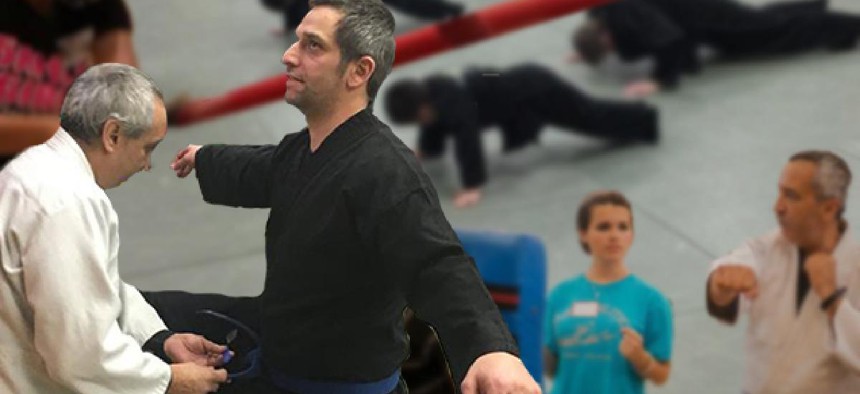Nonprofit teaches the visually impaired to see past limitations

Illustration by Zach Williams/ NYN Media
The Long Island-based nonprofit Third Eye Insight shows that a small nonprofit with limited resources can make the seemingly impossible become true for people with visual disabilities.
For the past eight years, founder Devin Fernandez has challenged children and adults to see past their visual impairments and imagine abilities that would be seem, at first glance, unfathomable for blind people. But the 60-year-old Bronx native teaches them martial arts at a West Islip dojo and has taken them to do archery, kayaking, horseback riding, skiing – water and snow – and even to the theater to hear a play.
Fernandez does this even though he, like many of them, cannot not see much beyond faint outlines and contrasts.
Nearly 400,000 people in New York state have some form of visual impairment, according to the National Federation of the Blind, yet Third Eye Insight is one of just a handful of nonprofits devoted to promoting sports among the blind. Nonprofit leaders said there is little funding available for an organization like Third Eye Insight, so it survives on interpersonal relationships, community donations, fees and the family members who help Fernandez run the organization.
For 99 percent of people who are visually impaired, a diagnosis means abandoning physical and outdoor activities – unless they meet Fernandez and take the first step toward enjoying activities that would seem to be just for sighted people.
“Getting the person to participate is half the battle,” Fernandez said. “And once they start participating they realize: I can do this, I can do this. It gives them the confidence to move forward.”
He was a in a similar predicament in 2000 when he was diagnosed with retinitis pigmentosa, a degenerative eye disease that results in blindness. A work accident several years prior likely played a role in activating the genetic disorder, Fernandez said he was told by doctors.
Severe electrical burns had resulted in temporary blindness. Though Fernandez recovered his sight, the deterioration resumed by his early 40s and was affecting his work life. He lost the ability to drive and his handyman business ground to a halt. An existential choice confronted him by 2010, he explained in a 2015 interview with the New York Public Library Community Oral History Project.
He said, “I would also ask, what is the purpose of what is going on here? Why am I going through this? And I didn’t want to be why me, why me, why me, because I look at so many other people who have other issues and situations and they move forward and that’s what I wanted to do.”
Starting a nonprofit offered him a path.
At first, it was not easy, but Fernandez was not alone in turning an idea to teach self-empowerment through martial arts, yoga and meditation into a community that bound a group of visually impaired people together on Long Island. One of his sisters co-founded the organization and became executive director. Another sister took on marketing and their mother became the bookkeeper.
In May 2010, six students assembled for the first class in a space donated by his ninpo ninjutsu instructor. A weekly gathering quickly became established, but growth opportunities were still limited to people interested in kicks, punches and earning new belts. Fernandez, like the leader of an fledgling nonprofit, had to decide after the first year whether Third Eye Insight was a nonprofit dependant on martial arts, yoga and meditation – or an organization that served a higher purpose.
A whole community resulted from that choice, former students said. Years of partnerships with other community organizations has exposed visually impaired people on Long Island to activities as diverse as a knife-throwing class to attending a performance of “A Christmas Carol” in Port Jefferson, where a group of guide dogs sat with their owners.
But opportunities like this can be hard to find for blind people in other areas of the state, according to Elizabeth Meade, associate executive director of Helen Keller Services for the Blind. Whether archery, the theater, martial arts or other activities, an organization like Third Eye Insight is unique among the organizations that help the visually impaired, she said.
“Oh my god, I wish there were more,” she said. “It’s very hard to find recreational athletic activities that are specifically geared for our people, people with visual disabilities … There’s no funding.”
NEXT STORY: NYN Media Buzz: Jan. 8, 2018